By Eric Vandenbroeck and co-workers
For Trump Greenland Is Not For Sale But He Is Free To Visit
The sun is rising
over the ice-covered mountains of Nuuk Fjord and we
are traveling along one of the world's last wild frontiers.
But shadows are
gathering here and across the rest of the frozen spaces of Greenland.
With Donald Trump
about to become president of the United States, his refusal to rule out taking Greenland
by force is
reverberating through conversations across the island.
"He's welcome to
come visit for sure," says the skipper of the converted fishing boat
taking us east. Conscious that he needs to do business with people of all
political hues, he asked not to be named but used a phrase I hear repeatedly
here.
"Greenland
belongs to Greenlanders. So, Trump can visit but that's it."
The waters are flat
and calm as we pull into the isolated settlement of Kapisillit
- population about 40 - where a few hunters are setting out to shoot seals.
It's -16C (3F), and
with wind chill effect feels more like -27C.
But near the harbor,
I meet a local church elder, Kaaleeraq
Ringsted, 73, a great-grandfather, who is out drying fillets of cod caught in
the fish-rich waters beside his front door.
When I ask about
President-elect Trump buying or invading Greenland, he chuckles at first. Then
his tone becomes serious.
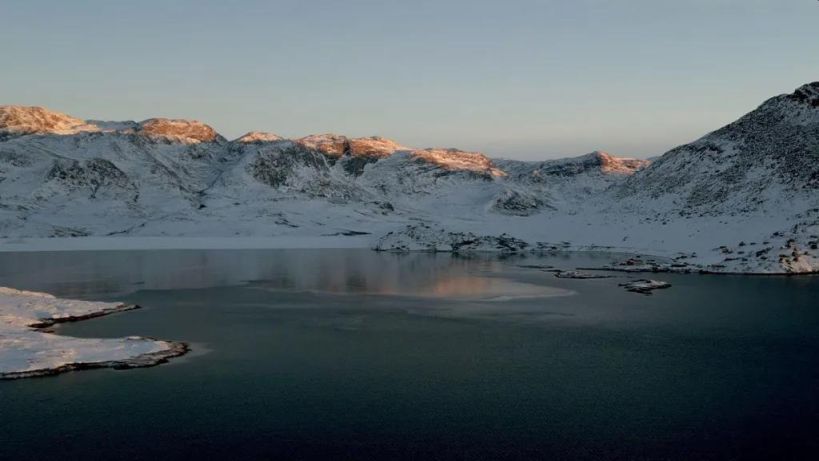
"It is not
acceptable that he says this. Greenland is not for sale."
Then he tells me how
he learned to fish and hunt here with his father and grandfather, and how he
wants to preserve this life for his children and grandchildren.
Crossing the bay, the
boat nosed through the broken surface ice. Two eagles perched on a rock,
scanning for fish in the clear waters.
We were heading to
the farm of Angutimmarik Hansen who keeps sheep as
well as hunting seals, wildfowl, and rabbits.
All
of his winter feed for the sheep needs to
be imported from Denmark, a reminder of how a harsh climate defines the
possibilities of life here.
Inside his front door
is a rack of hunting rifles. He notices me looking at them.
"Those are in
case there's an invasion," he jokes.
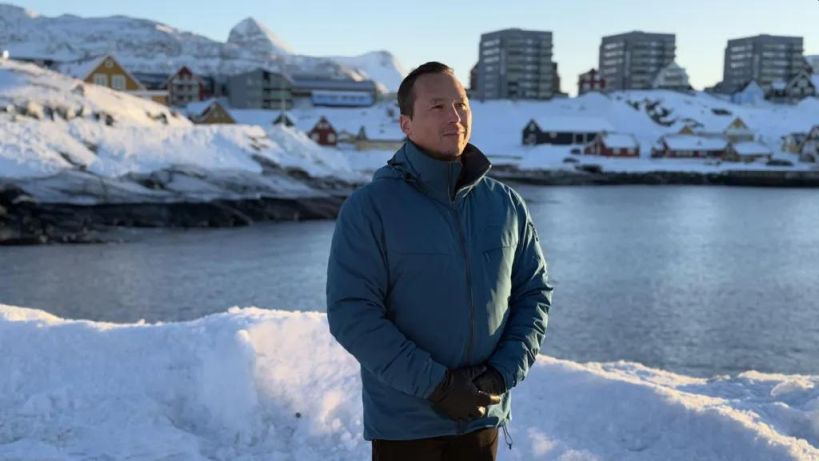
Kuno Fencker wants Greenland to negotiate directly
with the US, rather than through Denmark
"Donald Trump is
a politician," says Fencker.
"He's a hard
businessman, and we know his rhetoric, and that rhetoric is something we have
gotten used to since 2019, and it's just a matter of talking to a peer, an
ally, on how we can solve things here in the Arctic and also in Nato."
Fencker offers the
central argument of pro-independence campaigners.
"What is
necessary here is that Greenland as a sovereign state should negotiate directly
with the United States and not Denmark doing that for us."
Independence from
Denmark could come at a significant financial cost.
Greenland receives
subsidies from Copenhagen worth roughly a fifth of its GDP every year. Fencker
suggests, as have other leading figures here, that the island would negotiate
with America and Denmark for support.
"We are not
naïve regarding that. We need support in defense, security, and
also economic development. We want a sustainable and self-sufficient
economy."
The editor of the
local newspaper Sermitsiaq, Maasana
Egede, admits he was worried by the implied threat of force from Donald Trump,
but wants to see how reality matches the rhetoric.
As for
independence, Egede has been frustrated by what he sees as a polarised debate in the media - local and international.
"We are very
much telling this story that it has to be about independence or not
independence. But there's all of this story that is in
between, that people want independence, but not at any cost. There's a living
standard that has to be maintained. There's trade that
has to be maintained. There are living ways that have
to be maintained."
There is an
expectation that at some point - not in the immediate future - there will be a
vote in favor and Denmark will accept the result.
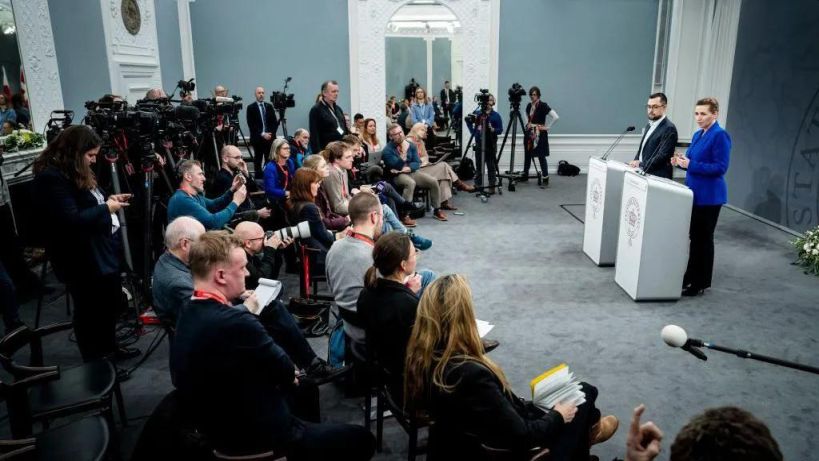
Greenland's Prime Minister, Mute Egede (l), spoke
alongside Danish Prime Minister, Mette Frederiksen
The island's Prime
Minister, Mute Egede, addressed a joint press conference with the Danish Prime
Minister, Mette Frederiksen, in the wake of the latest Donald Trump comments.
"We do not want
to be Danish, we do not want to be American, we want
to be Greenlandic," he said. The Danish PM took care not to offend
anybody, least of all the incoming US president.
"The debate on
Greenlandic independence and the latest announcements from the US show us the
large interest in Greenland," she said. "Events which set in motion a
lot of thoughts and feelings with many in Greenland and Denmark."
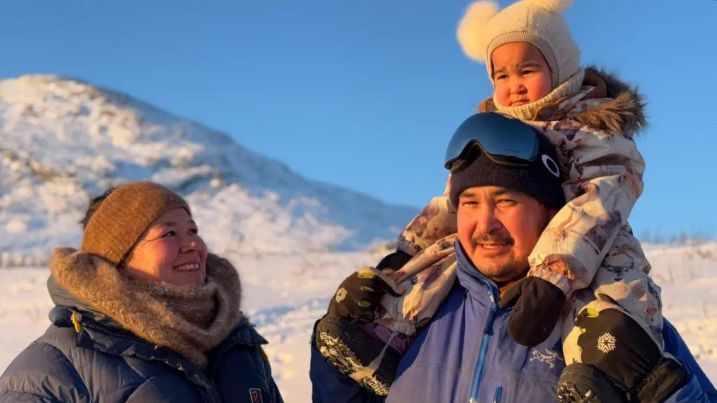
Angutimmarik Hansen (r) insists Greenland is not for sale
But his attitude to
the bellicose rhetoric from Mar-A-Lago is far from relaxed.
"What a stupid
person in the world like Trump," he says. "Never will we sell
Greenland."
This little farm is
about 3,000 miles (4,828km) from Florida where the incoming US president gave
his now infamous press conference last week.
"But Trump is
not the USA. We can work with the people of the USA," Hansen says.
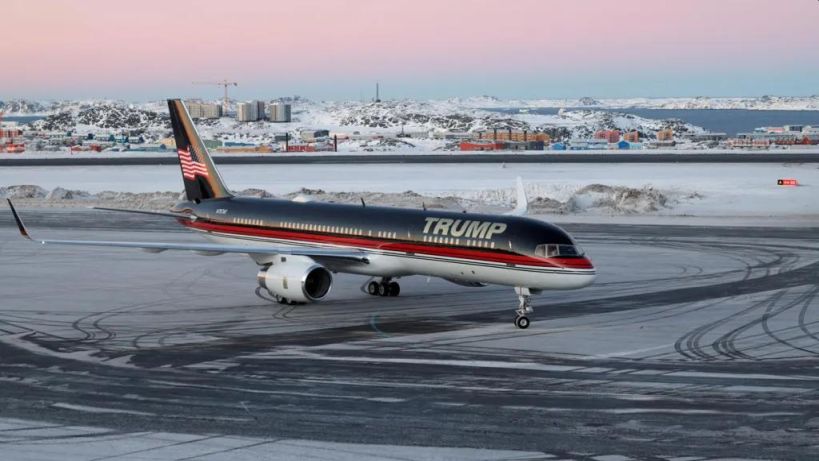
Donald Trump Jr visited Nuuk for several hours last
week
The Trump effect went
into overdrive with the arrival in Greenland of Donald Trump
Jr, hot on the heels of his father's
pronouncements. He flew into the capital Nuuk on the family's 737 jet - Trump
Force One - and stayed for four hours and thirty-three minutes, meeting some
locals and offering only polite remarks.
"It's been
incredibly nice to meet people, and people were very happy to meet with
us," he said, after lunch at a local hotel. "Dad will have to come
here."
Then it was back to
the sunnier climes of Florida.
Trump Jr was welcomed
by local businessman Jorgen Boassen, who once
campaigned for the president-elect.
He told local media
that he was Trump's "biggest fan" and that "of course, they are
interested in our country, and they are welcome to come and see what our
country is like. It is also about opening up for trade and cooperation."
The city of Nuuk is the
world's most northerly capital. It has a thriving civil society and a robust
press. And there is some satisfaction here that the Trump comments have
propelled the debate about Greenland's independence onto the international
stage.
There must be a
Greenland that is nobody's colony, say campaigners like Kuno Fencker, an MP
with the governing coalition and member of the local parliament's Foreign and
Security Committee.
We meet by the
harbor, under the bronze statue of Hans Egede, the 18th-century missionary
widely seen here as the man who opened the way to colonization.
Frederiksen knows
well how deep feelings run in Greenland. Memories of injustice and racism
remain fresh here among the indigenous Inuit
people.
Scandals like the
campaign to insert IUDs (Intrauterine devices) to prevent pregnancies in thousands
of Inuit women and girls in the 1960s and 70s, haunt the relationship between
Greenland and Denmark.
It's not known how
many of these procedures were carried out without the permission of those
involved, but the numbers are considerable. The aim was to reduce the
Greenlandic population.
Malvina Abelsen is a
former finance minister in Greenland's government and is now a consultant for
companies and organizations working on the island. She's also worked for UNICEF
Denmark and leading Greenland businesses, like the seafood group, Royal Greenland.
Abelsen believes far
more needs to be done to address the injustices of the past.
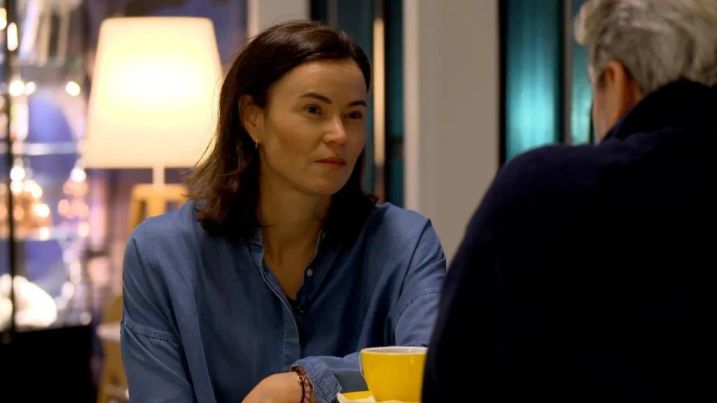
Malvina Abelsen says the pain of the past must be
fully acknowledged so Greenlanders can heal
"I think a lot
of people are saying, maybe also the Danish government and state have said, 'Oh
well, you know this happened in the past. This is so many years ago. How are we
going to be responsible for that? It's time to move on.'
"But you cannot
move on if you have not been healed, and if you have not been acknowledged to
what happened to you. That is a job that we have to do together with Denmark,
not something Greenland can do on its own."
And despite her high
profile in civil society and business, Maliina Abelsen says that when it comes
to racism - for example jokes about Inuit people - she "can speak for most
Greenlanders, that we have all experienced that in our life".
The issues of
self-determination and facing the past are intimately intertwined.
Now the intervention
of Donald Trump has placed both before the eyes of the world.
But the message we
heard - from the remote settlements on the fjord to the capital city Nuuk - is
that Greenland's destiny must be decided here, among people whose voices have
been too long overlooked.
For updates click hompage here